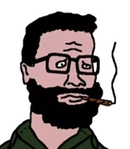So I’ve been thinking about this for 5 minutes and it bugs me.
There’a basically two frames of thought as to how revolutions can form.
A: People’s conditions become worse as the contradictions of capitalism widen, leading them to radicalization, and eventually revolution. For examples, look at any revolution. An extreme version of this may be called accelerationism, where these worsening conditions are celebrated, even when they are more likely to lead to fascism than communism.
B: Peoples’ conditions improve because of their organized opposition to capitalism through things like unions, and this new freedom leads them to radicalization, and eventually revolution. The logic here is that if the boot crushes you too hard, you will never have the ability to oppose it, much like how it becomes much easier to unionize if your job doesn’t control your health insurance. An extreme version of this may be social democracy, where the focus of revolution is lost completely in the quest for continuously improving these conditions under capitalism.
I know Marx and maybe Lenin have considered both of these things, I remember reading it. What I want to know is if there is a unified theory of the two.


Disclaimer: lazy post
I think the opposite happens really. When conditions get better due to things like unions and safety nets, all it does is tell people "see? You CAN put a leash on capitalism!" and as those small reforms slowly get rolled back over time, folks will go "ah what happened to the good old days"